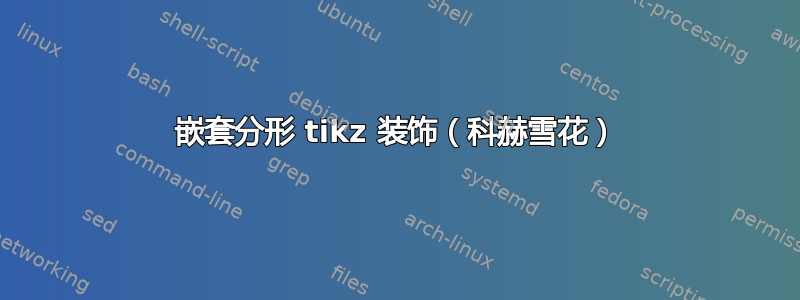
我正在尝试编写一些代码来允许使用装饰(例如来自的 Koch 雪花decorations.fractals),其中您提供一个参数来确定应用装饰的次数(以嵌套方式)。我尝试使用 pic,如下所述,但它会出现错误,因为装饰器要么有空参数,要么后面没有括号:
\documentclass{article}
\usepackage{tikz}
\usetikzlibrary{decorations.fractals}
\begin{document}
\newcommand{\koch}[1]{
\foreach \i in {1,...,#1}{decorate\{}
(0,0)--(1,0)
\foreach \i in {1,...,#1}{\}};
}
\tikzset{pics/koch/.style={decoration={Koch snowflake}
code={\draw \koch{#1}}
}
}
\begin{tikzpicture}
\path (0,0) pic {koch=4};
\end{tikzpicture}
\end{document}
我对此尝试了几种变体(它说\pic未定义)此代码说\tikz@parabola未定义并且错误似乎发生在pici和之间c(即错误消息分裂的地方)。
我最终想要的是一些代码,这样我就可以做类似的事情
\begin{tikzpicture}
\draw (0,0) \koch{4};
\draw (0,1) \koch{3};
\end{tikzpicture
获取 Koch 装饰器在某个间隔上的第 3 次和第 4 次迭代。我认为更好的方法是将装饰器和数字传递给某个对象,这样您就可以选择使用不同的分形装饰器。
答案1
这不是所需的答案,但是 Lindenmayer 系统怎么样?
\documentclass[tikz, border=5]{standalone}
\usetikzlibrary{lindenmayersystems}
\tikzset{koch snowflake/.style={insert path={%
l-system [l-system={rule set={F -> F-F++F-F}, axiom=F++F++F,
step=0.75cm/3^#1, angle=60, order=#1,anchor=center}] -- cycle}}}
\begin{document}
\tikz
\foreach \i in {0,...,4}
\fill (0,\i) [koch snowflake=\i] node [text=white, font=\sf] {\i};
\end{document}

答案2
和
\usepackage{tikz}
\usetikzlibrary{decorations.fractals}
循环
\def\deco{(C) -- (B) -- (A) --cycle}% "path at 0 decorations"
\let\decorationlist=\empty% create List
\foreach \n in {1,...,\NoIterations}
{
\ifx\empty\decorationlist{} \xdef\decorationlist{\deco}%
\else \xdef\deco{decorate{\deco}} \xdef\decorationlist{\decorationlist,\deco}%
\fi
}
生产
(C) – (B) – (A)
–cycle ,decorate (C) – (B) – (A) –
cycle ,decoratedecorate (C) – (B) –
(A) –cycle ,decoratedecoratedecorate
(C) – (B) – (A) –cycle
这可能是一种蛮力方法,但它确实有效。
%\documentclass[margin=5pt, tikz]{standalone}
\documentclass[a4paper]{article}
\usepackage[margin=1cm]{geometry}
\usepackage{tikz}
\usetikzlibrary{decorations.fractals}
\begin{document}
\section{Simple Example}
\begin{tikzpicture}[decoration=Koch snowflake]
\coordinate (A) at (0,0);
\coordinate (B) at (3,0);
\coordinate (C) at (60:3);
\draw[] (A) -- (B) -- (C) --cycle;
\draw[transform canvas={shift={(3.2,0)}}] decorate{ (C) -- (B) -- (A) --cycle};
\draw[transform canvas={shift={(6.4,0)}}] decorate{ decorate{ (C) -- (B) -- (A) --cycle} };
\end{tikzpicture}
%\newpage
\section{More systematic}
\pgfmathsetmacro\a{4.0}
\pgfmathtruncatemacro\NoIterations{6}
\pgfmathtruncatemacro\cols{3}
\pgfmathtruncatemacro\Cols{\cols-1}
\pgfmathtruncatemacro\Rows{ceil(\NoIterations/\cols)-1}
%\subsection{Info: cols: \cols, Cols: \Cols, Rows: \Rows}
\noindent\begin{tikzpicture}[decoration=Koch snowflake,
]
\coordinate (A) at (0,0);
\coordinate (B) at (\a,0);
\coordinate (C) at (60:\a);
\def\deco{(C) -- (B) -- (A) --cycle}% "path at 0 decorations"
\let\decorationlist=\empty% create List
\foreach \n in {1,...,\NoIterations}
{
\ifx\empty\decorationlist{} \xdef\decorationlist{\deco}%
\else \xdef\deco{decorate{\deco}} \xdef\decorationlist{\decorationlist,\deco}%
\fi
}
%\node[text width=6cm] at (0,-15) {Show decorationlist: \decorationlist};
\newcounter{mypos}
\setcounter{mypos}{-1}
\foreach \y in {0,...,\Rows} {
\foreach \x in {0,...,\Cols} {
\stepcounter{mypos}
\pgfmathsetmacro\Showcoord{\themypos < \NoIterations ? \themypos : ""}
\coordinate[label=left:{\Showcoord}] (Coord-\themypos) at (1.2*\a*\x,-1.2*\a*\y);
%\node[red, right] at (Coord-\themypos) {\x,\y};
}}
%\draw[] (Coord-1) circle[radius=\a];
\foreach[count=\n from 0] \decorationset in \decorationlist {
%\node[blue, below] at (Coord-\n){ABC};
\draw[transform canvas={shift={(Coord-\n)}}] \decorationset;
}
\end{tikzpicture}
\end{document}



